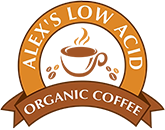What does it actually mean when a coffee is organic? Are there any benefits to buying organic coffee, and is it worth it?
There are a lot of claims out there from manufacturers and producers who want you to buy their products, and a lot of those claims don’t mean much. But “organic” is a term that really does have significance. Organically produced coffee has been verified to comply with a long list of FDA requirements. And, it comes with some benefits compared to conventionally produced coffee. That means that when you choose a product such as Alex’s Low-Acid Organic Coffee, you can be sure you’re getting a product that meets strict standards.
What It Means to Be Conventionally Produced
Before looking at what organic means, let’s look at conventional farming practices. These are the practices that farmers have adapted over the years to increase production. Conventional farming practices may include the following.
- Making use of deforestation to get more land for crops when the land that was previously used is not enough or is no longer fertile enough for the desired yield. This can happen when the same crop is repeatedly grown in the same space without crop rotation or letting the soil rest, or lay fallow, between cycles.
- Adding synthetic pesticides, herbicides, and fungicides with chemicals to soils and crops to increase crop yield. These are often sprayed from the air.
- Using artificial colors, flavors, or preservatives.
In contrast, organically produced crops have some key differences to comply with guidelines in the National Organic Program, or NOP.
The National Organic Program
The Department of Agriculture, or USDA, is in charge of the National Organic Program. It sets guidelines and enforces them. Standards are applied from the soil to the final packaging of the product. The USDA awards the designation of organic to products that meet the requirements.
These are some of the standards in the NOP.
- Crop rotation is required. This means that the same piece of land can only be planted with the same crop for a certain number of harvests or years before a different crop must be planted there. This allows for a continuation of nitrogen fixation to occur, which is critical for the natural nourishment of growing plants such as coffee plants.
- Prevention, Avoidance, Management, and Suppression, or PAMS, is the approach to managing pests. Organic coffee bean farmers must try to prevent or avoid infestations. If they occur, they must use physical or mechanical methods to control them rather than spraying chemicals.
- Decaffeinated organic coffee cannot be processed using standard chemicals. Alex’s Decaffeinated Low-Acid Organic Coffee instead uses an NOP-compliant process called the Swiss Water Process to remove over 99% of the caffeine that the coffee beans naturally contain.
The NOP is a serious program. The USDA doesn’t just set standards. It also enforces them. The USDA has periodic inspections of farms and processing facilities to be sure that the rules are being followed and that the products truly do comply with the requirements.
Organic Coffee and Health
Organic coffee is free from a long list of potentially harmful chemicals, such as those in many pesticides, herbicides, and fungicides. Conventionally grown coffee beans are often grown with compounds that have been shown to cause cancer or birth defects in humans or in animals.
Organic products have sometimes been shown to have a greater nutrient content. Coffee may not be super rich in a lot of vitamins and minerals, and it doesn’t have protein or fat, but it does contain numerous antioxidants that are linked to health benefits related to heart health, cognitive health, and metabolic health. It certainly wouldn’t hurt to have coffee beans that are higher in antioxidants due to their organic status!
Sustainability and the Environment
Choosing organic can also be good for the environment. Chemicals that are often used in conventional farming are not used in organic farming, and that means that they’re not released into the environment. It also means that they’re not exposing local residents to potentially toxic chemicals, either.
Finally, the NOP requires that soils be free from these chemicals for at least three years before planting a crop that will be organic. That means there’s a long time for the area to be free from synthetic and possible toxic chemicals by the time the crops are planted.
Choosing an Organic Coffee
There are many brands of coffee that are organic or have organic varieties, so how do you choose just one? Here’s why we’re confident that you should try Alex’s Low-Acid Organic Coffee.
- It has a great-tasting blend of coffee beans from the Chiapas region in Mexico, Nicaragua, and Honduras. Flavor notes include caramel, vanilla, citrus, pear, and hazelnuts.
- It’s much lower in acid than the majority of coffees. That’s great news if you have acid reflux or have been told to limit acid in your diet.
- It is roasted to a medium dark French Roast degree. That gives it a chocolatey flavor to compliment the natural flavors in the raw beans.
- Our freshness is top of the line due to our packaging and careful handling from the moment the coffee beans are harvested.
- Our coffee comes in Regular, Half Caff, and Decaffeinated versions, and each comes in Whole Bean and Ground varieties. That means you can get your exact preference.
Qualifying as “organic” is a meaningful achievement we are proud to be part of at Alex’s Low-Acid Organic Coffee. We take pride in our healthy coffee and support for sustainability, the environment, and local growers and producers. With our great-tasting blend of beans, freshness guarantee, and coffee that’s free from a long list of chemical additives, we are eager for you to give us a try and taste the difference.

